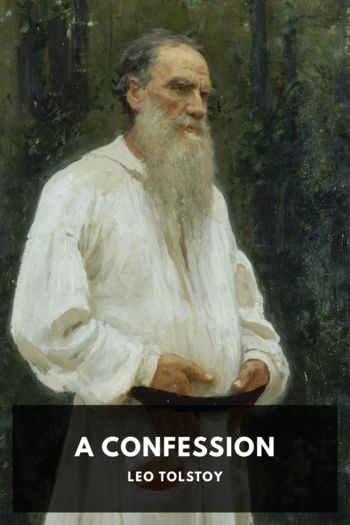Short Fiction by Leo Tolstoy (book reader for pc TXT) 📕

- Author: Leo Tolstoy
Book online «Short Fiction by Leo Tolstoy (book reader for pc TXT) 📕». Author Leo Tolstoy
Twice I walked up and down past the Englishman, and each time, without turning out for him, my elbow punched him, which gave me a feeling of indescribable satisfaction; and then, darting down the steps, I hastened through the darkness in the direction toward the city taken by the little man.
Overtaking the three men who had been walking together, I asked them where the singer was; they laughed, and pointed straight ahead. There he was, walking alone with brisk steps; no one was with him; all the time, as it seemed to me, he was indulging in bitter monologue.
I caught up with him, and proposed to him to go somewhere with me and drink a bottle of wine. He kept on with his rapid walk, and scarcely deigned to look at me; but when he perceived what I was saying, he halted.
“Well, I would not refuse, if you would be so kind,” said he; “here is a little café, we can go in there. It’s not fashionable,” he added, pointing to a drinking-saloon that was still open.
His expression “not fashionable” involuntarily suggested the idea of not going to an unfashionable café, but to go to the Schweitzerhof, where those who had been listening to him were. Notwithstanding the fact that several times he showed a sort of timid disquietude at the idea of going to the Schweitzerhof, declaring that it was too fine for him there, still I insisted in carrying out my purpose; and he, putting the best face on the matter, gayly swinging his guitar, went back with me across the quay.
A few loiterers who had happened along as I was talking with the minstrel, and had stopped to hear what I had to say, now, after arguing among themselves, followed us to the very entrance of the hotel, evidently expecting from the Tyrolese some further demonstration.
I ordered a bottle of wine of a waiter whom I met in the hall. The waiter smiled and looked at us, and went by without answering. The head waiter, to whom I addressed myself with the same order, listened to me solemnly, and, measuring the minstrel’s modest little figure from head to foot, sternly ordered the waiter to take us to the room at the left.
The room at the left was a barroom for simple people. In the corner of this room a hunchbacked maid was washing dishes. The whole furniture consisted of bare wooden tables and benches.
The waiter who came to serve us looked at us with a supercilious smile, thrust his hands in his pockets, and exchanged some remarks with the humpbacked dishwasher. He evidently tried to give us to understand that he felt himself immeasurably higher than the minstrel, both in dignity and social position, so that he considered it not only an indignity, but even an actual joke, that he was called upon to serve us.
“Do you wish vin ordinaire?” he asked with a knowing look, winking toward my companion, and switching his napkin from one hand to the other.
“Champagne, and your very best,” said I, endeavoring to assume my haughtiest and most imposing appearance.
But neither my champagne, nor my endeavor to look haughty and imposing, had the least effect on the servant: he smiled incredulously, loitered a moment or two gazing at us, took time enough to glance at his gold watch, and with leisurely steps, as though going out for a walk, left the room.
Soon he returned with the wine, bringing two other waiters with him. These two sat down near the dishwasher, and gazed at us with amused attention and a bland smile, just as parents gaze at their children when they are gently playing. Only the dishwasher, it seemed to me, did not look at us scornfully but sympathetically.
Though it was trying and awkward to lunch with the minstrel, and to play the entertainer, under the fire of all these waiters’ eyes, I tried to do my duty with as little constraint as possible. In the lighted room I could see him better. He was a small but symmetrically built and muscular man, though almost a dwarf in stature; he had bristly black hair, teary big black eyes, bushy eyebrows, and a thoroughly pleasant, attractively shaped mouth. He had little side-whiskers, his hair was short, his attire was very simple and mean. He was not over-clean, was ragged and sunburnt, and in general had the look of a laboring-man. He was far more like a poor tradesman than an artist.
Only in his ever humid and brilliant eyes, and in his firm mouth, was there any sign of originality or genius. By his face it might be conjectured that his age was between twenty-five and forty; in reality, he was thirty-seven.
Here is what he related to me, with good-natured readiness and evident sincerity, of his life. He was a native of Aargau. In early childhood he had lost father and mother; other relatives he had none. He had never owned any property. He had been apprenticed to a carpenter; but twenty-two years previously one of his hands had been attacked by caries, which had prevented him from ever working again.
From childhood he had been fond of singing, and he began to be a singer. Occasionally strangers had given him money. With this he had learned his profession, bought his guitar, and now for eighteen years he had been wandering about through Switzerland and Italy, singing before hotels. His





Comments (0)